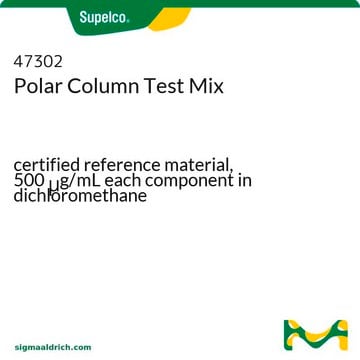All Photos(2)
About This Item
Linear Formula:
NaClO3
CAS Number:
Molecular Weight:
106.44
EC Number:
MDL number:
UNSPSC Code:
12352302
PubChem Substance ID:
NACRES:
NA.55
Assay:
≥99%
form:
crystals or chunks
Recommended Products
Quality Level
product line
ReagentPlus®
Assay
≥99%
form
crystals or chunks
mp
248-261 °C (lit.)
SMILES string
[Na+].[O-]Cl(=O)=O
InChI
1S/ClHO3.Na/c2-1(3)4;/h(H,2,3,4);/q;+1/p-1
InChI key
YZHUMGUJCQRKBT-UHFFFAOYSA-M
Looking for similar products? Visit Product Comparison Guide
Related Categories
General description
Sodium chlorate exhibits piezoelectric effect. On heating, it decomposes to give sodium chloride and sodium perchlorate. It can be synthesized in laboratory by reacting chlorine gas with a hot aqueous solution of sodium hydroxide or sodium carbonate.
Application
Sodium chlorate (NaClO3) has been used in the preparation of aromatic amino acid and σ32 peptide (from Drosophila melanogaster) samples for NMR analysis.
It may be used in the synthesis of chlorine dioxide and sodium perchlorate. It may also be employed as a sulfation inhibitor in the culture medium of HepG2 cells ((human hepatocellular liver carcinoma cells).
It may be used in the synthesis of chlorine dioxide and sodium perchlorate. It may also be employed as a sulfation inhibitor in the culture medium of HepG2 cells ((human hepatocellular liver carcinoma cells).
Biochem/physiol Actions
sulfation biosynthesis inhibitor
Legal Information
ReagentPlus is a registered trademark of Merck KGaA, Darmstadt, Germany
Signal Word
Danger
Hazard Statements
Precautionary Statements
Hazard Classifications
Acute Tox. 4 Oral - Aquatic Chronic 2 - Ox. Sol. 1
Storage Class Code
5.1A - Strongly oxidizing hazardous materials
WGK
WGK 2
Flash Point(F)
Not applicable
Flash Point(C)
Not applicable
Choose from one of the most recent versions:
Already Own This Product?
Find documentation for the products that you have recently purchased in the Document Library.
Customers Also Viewed
Jung Ho Lee et al.
The journal of physical chemistry. B, 117(20), 6069-6081 (2013-04-09)
NMR is an extremely powerful, yet insensitive technique. Many available nuclear polarization methods that address sensitivity are not directly applicable to low-concentration biomolecules in liquids and are often too invasive. Photochemically induced dynamic nuclear polarization (photo-CIDNP) is no exception. It
Cristóbal Viedma et al.
Chemical communications (Cambridge, England), 47(48), 12786-12788 (2011-11-05)
A single-chirality solid phase can be obtained in boiling solutions containing a racemic mixture of left- and right-handed enantiomorphous crystals due to dissolution-crystallization cycles induced by a temperature gradient. This phenomenon provides further insights into asymmetric amplification mechanisms under presumably
Fredrik Lanner et al.
Stem cells (Dayton, Ohio), 28(2), 191-200 (2009-11-26)
Embryonic stem (ES) cells continuously decide whether to maintain pluripotency or differentiate. While exogenous leukemia inhibitory factor and BMP4 perpetuate a pluripotent state, less is known about the factors initiating differentiation. We show that heparan sulfate (HS) proteoglycans are critical
J B Taylor et al.
Journal of animal science, 90(1), 381-386 (2011-08-02)
Our objective was to establish doses of orally administered NaClO(3) that reduced the presence of generic Escherichia coli in intestines of ewes and neonatal lambs managed in a shed-lambing system. Neonatal lambs (n = 32; age = 7.1 ± 1.2
Ludmila Abezgauz et al.
Journal of colloid and interface science, 342(1), 83-92 (2009-11-27)
Controlling the morphological characteristics of micellar solutions is important for surfactant performance and for achieving desired properties. In this work we study how monovalent anions of the lyotropic series affect micellization, micellar transitions, and micellar growth of the cationic surfactant
Our team of scientists has experience in all areas of research including Life Science, Material Science, Chemical Synthesis, Chromatography, Analytical and many others.
Contact Technical Service












